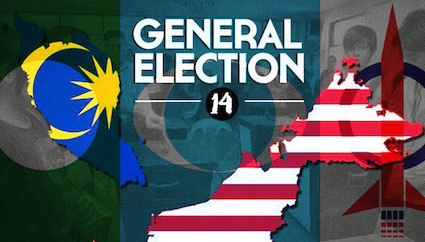Stormy days in land below the wind

Philip Golingai and Muguntan Vanar, The Star
Sabah’s importance as Barisan Nasional’s fixed deposit has been underlined by Prime Minister Datuk Seri Najib Tun Razak. The state is his first stop after nomination day.
This time, Sabah Barisan is facing its biggest challenge since 1994 when it wrested the state back from Parti Bersatu Sabah (PBS) which was then an opposition party.
The current Tan Sri Musa Aman-led state Barisan coalition, comprising Umno, PBS, Upko, LDP, MCA, Gerakan and PBRS, is facing a formidable but fractured Opposition in multi-cornered fights.
“Having contested in the last two elections, this one seems to be a hot battle. It is the mother of election battles,” says Liberal Democratic Party (LDP) president Datuk Teo Chee Kang.
“The fight is very tight especially in Kadazandusun Murut parliament seats which Barisan is holding,” said political analyst Mohd Rahezzal Shah, adding that the Opposition had already won two Chinese-majority MP seats in the state in 2013.
In GE13, Barisan won 22 of the 25 parliamentary seats in Sabah, losing Kota Kinabalu and Sandakan to DAP and Penampang, a Kadazandusun/Chinese seat, to PKR.
“Since 1994, we have had four general elections – each with its own stories – but unlike those four, GE14 poses a different challenge altogether.
“The Opposition is being led by a prominent former Barisan/Umno national leader (Datuk Seri Mohd) Shafie Apdal,” said Nixon Abdul Habi, a Semporna Umno leader.
Shafie, who was suspended as an Umno vice-president, quit the party in 2016 and he took over a shell political party and renamed it Parti Warisan Sabah.
Mohd Rahezzal, a UiTM lecturer and fellow at the Society Empowerment and Economic Development of Sabah, agrees with Nixon.
“One of the big factors in this election in Sabah is Warisan. Why Warisan and not other local-based Opposition parties? Not since PBS have we seen a Sabah party that is as big as Warisan in terms of penetration in the state,” he said.
(The Tan Sri Joseph Pairin Kitingan-led PBS toppled Berjaya – a now defunct Barisan component party – and governed Sabah from 1985 to 1994.)
“Warisan is similar to PBS, which is led by Pairin, the Kadazandusun and Murut Huguan Siou (paramount leader) and supported by Muslim and Chinese leaders. Warisan is led by Shafie who is a Bajau leader from the east coast of Sabah and supported by Kadazandusun and Chinese leaders,” Mohd Rahezzal said.
Former Sabah chief minister Datuk Yong Teck Lee has a different take on the anticipated wind of change.
“Umno is facing internal conflict over its selection of candidates and Warisan is drawing ‘outsider votes’ from those who have traditionally voted for Umno,” said the Sabah Progressive Party (SAPP) president.
“Kadazan Dusun Murut voters will be backing Gabungan Sabah and as far as Chinese voters are concerned, it is well known that they are openly Opposition-leaning.”
SAPP (Sabah Progressive Party) is part of Gabungan Sabah, an Opposition alliance consisting of Sabah Star led by Bingkor assemblyman Datuk Dr Jeffrey Kitingan, Parti Harapan Rakyat Sabah led by Klias assemblyman Datuk Lajim Ukin and Parti Perpaduan Rakyat Sabah (PPRS).
The other major Opposition alliance in Sabah consists of Warisan, PKR and DAP.
These two opposition alliances could not reach an electoral pact and are set to split the Opposition votes.
“Despite the formidable Opposition, Barisan will win most of the multi-cornered fights,” according to political analyst Mohd Rahezzal.
Of the 25 parliamentary seats in Sabah, two will see six-cornered fights, three five-cornered fights, 11 four-cornered fights, eight three-cornered fights and one straight fight.
“What do these numbers tell you? They tell you that the Opposition votes will be split and Opposition alliances will not win many seats,” said Mohd Rahezzal.
But with Shafie leading Warisan, is there a possibility of a Bajau tsunami against Barisan?
“Shafie, being a Bajau/Suluk, has been trying to galvanise support mainly from the predominantly Bajau/Suluk-dominated constituencies previously represented by Usno (which made way for Umno). There are about 18-20 state seats that are having significant, if not majority, Bajau/Suluk voters,” said Nixon, a Bajau.
“Shafie has played the war cry of Sabah for Sabahan as well as Sabah Ubah by attacking the state leadership directly. He portrayed the Bajau/Suluk as the bedrock of the Umno-led government who are being discriminated against and not getting their rightful and deserved treatment,” he added.
Mohd Rahezzal said: “One thing I can say is that Warisan has created a momentum that can give Barisan a good fight. Their Sabah Ubah slogan is popular wherever you go in the state. But the thing with them is they will lose stamina towards polling day.
“Barisan is much more organised in terms of its machinery whereas Warisan’s support is based on sentiment. On nomination day, the word from the ground was that there were many Warisan supporters who are not happy with the candidates the party has fielded.”
Sabah politics is fluid. But Mohd Rahezzal predicts that Barisan can withstand the winds of change.


